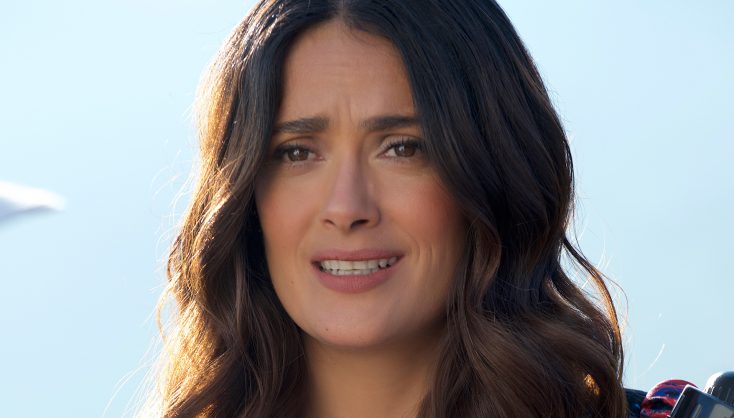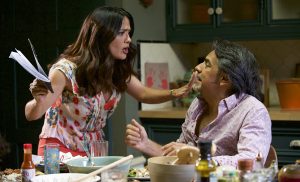By ANGELA DAWSON
Front Row Features
HOLLYWOOD—Salma Hayek has been outspoken about her concern over President Trump’s proposed crackdown on illegal immigration and plans to construct a wall along the U.S.-Mexico border. The Mexico-born actress hopes to spread her message of acceptance and inclusiveness through her work. What better way to reach people than through comedy?
Hayek, who earned an Academy Award nomination for her starring role in the 2002 drama “Frida,” in which she played Mexican surrealist painter Frida Kahlo, now stars in the comedy “How to Be a Latin Lover.” She plays a Mexican immigrant who reluctantly allows her ne’er-do-well brother, recently dumped by his aging sugar mama wife for a younger man, to live with her and her young son in their small but tidy Los Angeles apartment until he can get back on his feet. The brother, Maximo, is played by popular Mexican comedian Eugenio Derbez, who previously had a supporting role as the unconventional doctor in last year’s “Miracles From Heaven.” The estranged siblings reconnect and learn of the importance of family.
Hayek, 50, says making “How To Be a Latin Lover” was like “a vacation” for her because it is one of the few projects she’s been involved in over the past few years where she wasn’t also a producer. In addition to co-starring with Derbez, with whom she shares a birthday (Sept. 2), Hayek worked alongside Rob Lowe, who plays Maximo’s rival himbo, Kristen Bell, Rob Corddry, Rob Riggle and Raquel Welch, who plays the sexy rich grandmother Maximo hopes to seduce. While the Ken Marino-directed comedy is mostly in English, Hayek and Derbez speak Spanish in many of their scenes, which are subtitled.
Dressed in a burgundy color dress with red polka-dots and sitting cross-legged on a chair, Hayek spoke about working her Mexican colleague, speaking her native tongue in a Hollywood film and, of course, her thoughts on immigration.
Q: Your character, Sara, is frustrated by her brother’s unwillingness to get a real job, and in her frustration, she hits him. How many times do you think you hit Eugenio in this film?
Hayek: Not enough. (She laughs.) But you know there is a technique. It’s not like I’m whacking him. There’s a technique. You flip your wrist like this and you just brush it like that and it goes like this. See? See? It doesn’t hurt.
Q: You have a brother in real life, right?
Hayek: Yeah, I have a brother and I’m Mexican. I have 300 cousins.
Q: As Sara, you and Eugenio share a Mexican song and salsa dance in this film. Where did the idea for that come from?
Hayek: I remember that and I said to Eugenio, “Let’s bring back the Sape because I really think we can start a trend here. It’s going to be the Sape era.
Q: Was Ken Marino cool with all the Spanish you guys used in the film?
Hayek: He was game. Sometimes we would start improvising for a long time and he would get lost. I give it to him he did catch it. He’s smart. He was looking at the crew’s reaction, and if they were laughing and interested, then he would let us go. Sometimes, he would become a little nervous and say, “Okay guys, that was great. What was it?” It was very hard to translate to him because some things if you over translate them, they lose some of their meaning. There are many things that do work in the translation and I think that’s the strength of this movie. It combines real Mexican and Latin American humor with American humor. It’s not like an American film, which has a couple of Mexicans and a couple of words in Spanish, and yet it also has an American sensibility. It’s the mixture of the two sensibilities, dancing together, that makes the film special. It has a special personality that works universally for all types of audiences. That’s what makes it a little different from all the other comedies.
Q: What is the key to collaboration?
Hayek: To listen. It’s very simple. If the people are listening to each other you can always get to a negotiation. It’s when somebody wants what they want without hearing that you get into trouble and there is no possibility for growth. Those people should just do monologues on stage.
Q: You’re known for producing a lot of your projects. What other hats did you wear on this one besides actress?
Hayek: That was it. Thank God, I didn’t produce it. I was on vacation on this one. It was so much fun. I arrived at the end (of production) and they put all my scenes together. Everyone was nice. Everybody was talented. There was a lot of freedom. I loved the people involved. I really liked the script but I was so excited to come and have the anticipation of, “What we are going to turn it into today?” There was so much adding to what was already there. I was actually excited to see where it was going to go. And we got to improvise in our own language. It’s a whole different ballgame.
Q: How was it getting up to speed on what was already shot?
Hayek: Ken Marino (the director) sent me footage of what they had shot because I was not here until the end and I saw Eugenio’s son coming out of the pool and I went, “Wow, that’s some good plastic surgery! I’m going to look like his grandma in the movie.” And then I realized that it wasn’t (Eugenio). For a moment, I went, “Oh my God, I want a doctor!” (She laughs.)
Q: You’ve been outspoken about your views on President Trump’s pledge to build a wall and crack down on illegal immigration. What do you want people to know about your views on this issue?
Hayek: Most of these illegal workers are very skilled at working as farmers. They do not want to be farming drugs. In fact, most of the people that come here are people that do not want to have anything to do with drugs. Right now, it’s the easy way to offer their skills for that but they don’t want to do that so a lot of them came here because there is a lot of work for the farmers here, and there’s not a lot of resources for this work. And there’s a magic thing to it too. You actually have to have a skill for it and you have to be so strong. It’s one of the hardest labors. It doesn’t seem like it. But the position (bending) at the back—it’s something really, really hard to do—to endure.
(Migrant workers) have the endurance. They have the skill. And they have something magical that is called a green thumb. If you don’t have the right energy with your hands, and everybody knows this, you kill the plants. There are so many gardeners. We work with the plants a lot. We are good with this skill and America needs people who are good with this skill.
The problem with immigration needs to be resolved. There are many ways to resolve it. There was a time when (migrant workers) were doing this with a permit in the time they could do that and go back to Mexico. They don’t want to stay here. These specific workers are really good for the economy of America. And there’s not that many people that want to do it—especially not at that price.
If they could work legally, then they would pay the taxes that benefits America. There needs to be an immigration reform. It is really horrible that we’re not spending the time actually working out a good, well planned, well thought out immigration reform. And we’re spending the resources trying to build a wall that is a waste of time and money. Number one, it’s going to cost billions of dollars. Number two, it’s the most absurd thing because what are you going to do when you hit the river? You’re going to go over the mountain, through the river where there’s going to be dams too? How do you build a wall through the many rivers that cross the border? And number three, it doesn’t matter. Some people will still get in because there is a wall that some people don’t walk around. They’ll go above the wall, underneath the wall. It’s terrible, psychologically speaking. It’s dumb. What we actually do need is a smart plan like more guest-worker visas.






